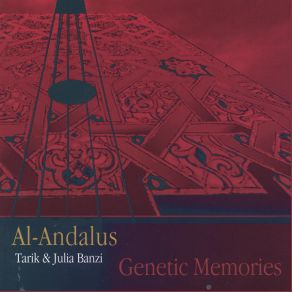Genetic Memories
Download links and information about Genetic Memories by Tarik, Al Andalus. This album was released in 1997 and it belongs to New Age, Jazz, World Music genres. It contains 11 tracks with total duration of 49:51 minutes.

|
|
|---|---|
| Artist: | Tarik, Al Andalus |
| Release date: | 1997 |
| Genre: | New Age, Jazz, World Music |
| Tracks: | 11 |
| Duration: | 49:51 |
| Buy it NOW at: | |
| Buy on iTunes $9.99 | |
Tracks
[Edit]| No. | Title | Length |
|---|---|---|
| 1. | Secrets | 5:43 |
| 2. | Marrakesh | 2:08 |
| 3. | Katrinile | 3:24 |
| 4. | Echos | 2:46 |
| 5. | Chiaroscuro | 5:00 |
| 6. | Yo M'Enamori | 2:46 |
| 7. | Portrait of Zahra | 3:02 |
| 8. | Afgano | 6:55 |
| 9. | Absence | 4:26 |
| 10. | Inherited Messenger | 5:31 |
| 11. | Ancestors | 8:10 |
Details
[Edit]On the basis of Genetic Memories, you have to think that either Tarik and Julie Banzi don't want to be boxed into any single category or they really don't know what they want to be. While the focus is on Middle Eastern music, often superbly played, "Secrets" falls firmly into the new age pigeonhole, and both "Absence" and "Ancestors" are jazz, although the former takes a very bizarre and disquieting left turn when a computer begins reciting a 12th century poem — interesting, but it certainly doesn't fit with the music. Really, they're at their best when they play it straight, performing music that's at least influenced by the Middle Eastern (and beyond) tradition, even when it's from their own pens. "Yo M'Enamori" is a prime case. From the Sephardic Jewish tradition, it's beautifully sung by Ranjani Krishnan, and Tarik Banzi's oud playing is a delight on a song that simply glistens. And the same is true for "Afgano," which comes from Afghanistan. The instrumentals "Marrakesh" and "Chiarascuro" both shine as brightly, with Julie Banzi's flamenco playing the glue that holds it all together, relatively unassuming but vitally important in the mix, while Tarik takes center stage with oud. As an exploration of the Islamic influence on Spain in the Middle Ages, it's somewhat lost and it's certainly far from being a cohesive record. But the moments of pleasure outweigh those of frustration and questioning, and make you think that if they ever finally discover and tune their focus, they could become very important in Arab-American musical circles.